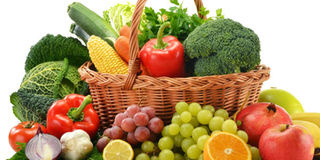How to maintain nutrients in vegetables

Vegetables are one of the foods that contain nutrients that our bodies need and eating them daily boosts immunity. The way we prepare our vegetables can either reduce the nutrients or eliminate them completely. Each vegetable is prepared in a different way, depending on what the person intends to get by consuming it.
Preparation
Esther Lakot, a nutritionist at Eat Healthy Centre, says retention of nutrients starts from the initial preparation.
She says the best vegetables to consume are those that are fresh from the garden but since most people buy from the market, then you should make sure that the colour is right and it should not have any damage.
“To determine their freshness, feel the texture of the vegetables. For example, when a vegetable such as cabbage is firm, this means it is fresh,” says Lakot. She advises those preparing vegetables to wash them before they are chopped because after they have been chopped, the nutrients are exposed and will be washed away.
She further says vegetables should not be chopped in tiny pieces because this somehow becomes a hindrance in the preparation process as they could get over cooked. “If the vegetables need to be peeled, make sure that you peel off a thin layer because most of the nutrients are just below the top layer and peeling off too much means you lose the nutrients.”
Cooking
Salaam Majid, a nutritionist, says the aspects that affect vegetables are water and heat.
“Most vegetables do not need water added while cooking because they produce their own,” Majid says.
He urges people to avoid using too much cooking oil or deep frying the vegetables but rather opt to boil, dry fry or blanch them, which retains their nutrients.
“While preparing the vegetables, you may add very little water and let it cook for not more than 10 minutes because beyond that the nutrients will be lost,” says Majid. However, in case one decides to drain the excess water, he says you can use it to cook other foods such as rice or even soup.
“While cooking, the sauce pan should be covered for five minutes to make sure the vegetables are soft then remove the cover and allow them to sit for a few more minutes before consuming,” he says.
He advises that root vegetables such as carrots be cooked with their peelings while vegetables that have been stored or refrigerated for long should not be consumed since most would have gone bad or lost their nutrients.
Raw vegetables
Dr Eric Tumwesigye, a general practitioner at Queen’s Health Centre, says eating vegetables raw is an important part of a healthy and balanced diet. Adding salads is not bad but the preparation process will determine how safe they are to eat.
“Because they can be contaminated, the best thing to do is wash them and avoid consuming already damaged vegetables raw because they will have accumulated bacteria from the surroundings,” Dr Tumwesigye says.
He adds that when salads are prepared, they should be consumed immediately. “Vegetables such as cabbage should also be washed in warm salty water to remove most of the contact pesticide residues that normally appear on the surface of the vegetables and fruits,” he advises.
Lakot concludes by saying that one of the best ways to consume vegetables is juicing, which retains most of the nutrients.




